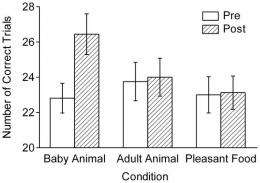October 2, 2012 report
'Kawaii' power sharpens worker focus, says Japanese study

(Medical Xpress)—Office workers who wonder why there are so many new framed pictures of piglets, calves, and puppies in the employee lunch room may learn their boss has read about research coming from Japan. Hiroshima University researchers say they have experiments to show that looking at pictures of cute baby animals can have an impact on worker performance. Not only happiness but the power of concentration can stem from seeing kawaii (cute) animals, according to the research. As box-office earnings by Hollywood studios from their animated films can also suggest, little animals with big eyes and large heads stir positive feelings of friendliness and nurturing. Now the study says pictures of baby animals can translate into good worker performance.
Published online in the journal PLOS ONE, the authors maintain that looking at cute baby animals can support tasks that need workers' narrow focus and concentration.
The authors concluded that viewing "cute" images improved performance on tasks that required "carefulness." This effect was found in a fine motor dexterity task that was related to helping others and even in a non-motor visual search task that was irrelevant to caregiving or social interaction. "This study provides further evidence that perceiving cuteness exerts immediate effects on cognition and behavior in a wider context than that related to caregiving or social interaction."
The authors asked 48 college students to play a game requiring manual dexterity. Using tweezers, they had to pluck out tiny pieces from holes in a "body." After one round of the game, half of the students were given seven images of cute baby animals. The other students were asked to view pictures of adult animals. Then the participants went back for a second round of the game. Students who had viewed the baby animals plucked more game pieces than they had in the first round. The others hardly improved their performance.
Researchers think the nurturing response to the pictures may have translated over to helping the game-board body.
In another test scenario, 48 new participants looked at numerical clusters. They had to find how many times a certain digit appeared. The students were divided into three groups. Two groups looked at either baby or adult animal pictures. The third group looked at pictures of tasty-looking foods like sushi and steak. Students who looked at the baby animal pictures did better on the number matrix task as well on the second time around, while the others did not significantly improve.
"Kawaii things not only make us happier, but also affect our behavior," wrote the researchers, led by Prof. Hiroshi Nittono, a cognitive psychologist. "This study shows that viewing cute things improves subsequent performance in tasks that require behavioral carefulness, possibly by narrowing the breadth of attentional focus."
Prof. Nittono is part of the Cognitive Psychophysiology Laboratory at Hiroshima University. He said the lab's main interest is a better understanding of "daily psychological activities by using event-related potentials (ERPs) and other psychophysiological measures." The paper suggests such effects from seeing baby animals may benefit office workers and drivers toward exercising "careful" behavioral tendencies.
The authors recognize, however, that looking at puppies and kittens might not have a consistently universal effect as the concept of "kawaii" is a key concept of modern Japanese culture. More study would be needed to see how the picture-viewing experience translates elsewhere. Kawaii may be translated as cute, but a subtle difference exists, he noted.
"Kawaii" he said is a positive emotion related to the social motivation of protecting and nurturing others, which originally stems from affection toward babies and infants. It also connotes the Japanese notion of amae, behavior or motivation to gain others' love and acceptance and chizimi shikou, an orientation toward miniature size.
More information: Nittono H, Fukushima M, Yano A, Moriya H (2012) The Power of Kawaii: Viewing Cute Images Promotes a Careful Behavior and Narrows Attentional Focus. PLoS ONE 7(9): e46362. doi:10.1371/journal.pone.0046362
Abstract
Kawaii (a Japanese word meaning "cute") things are popular because they produce positive feelings. However, their effect on behavior remains unclear. In this study, three experiments were conducted to examine the effects of viewing cute images on subsequent task performance. In the first experiment, university students performed a fine motor dexterity task before and after viewing images of baby or adult animals. Performance indexed by the number of successful trials increased after viewing cute images (puppies and kittens; M ± SE = 43.9±10.3% improvement) more than after viewing images that were less cute (dogs and cats; 11.9±5.5% improvement). In the second experiment, this finding was replicated by using a non-motor visual search task. Performance improved more after viewing cute images (15.7±2.2% improvement) than after viewing less cute images (1.4±2.1% improvement). Viewing images of pleasant foods was ineffective in improving performance (1.2±2.1%). In the third experiment, participants performed a global–local letter task after viewing images of baby animals, adult animals, and neutral objects. In general, global features were processed faster than local features. However, this global precedence effect was reduced after viewing cute images. Results show that participants performed tasks requiring focused attention more carefully after viewing cute images. This is interpreted as the result of a narrowed attentional focus induced by the cuteness-triggered positive emotion that is associated with approach motivation and the tendency toward systematic processing. For future applications, cute objects may be used as an emotion elicitor to induce careful behavioral tendencies in specific situations, such as driving and office work.
© 2012 Medical Xpress















